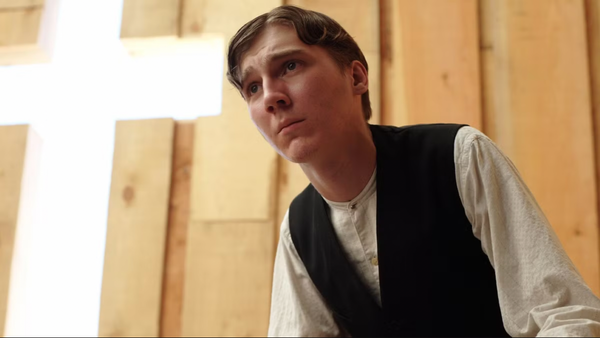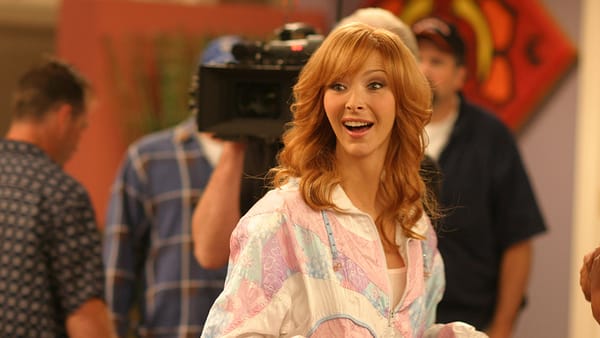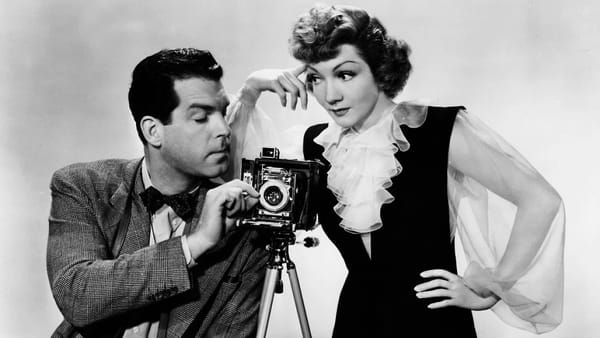Psycho. #39
On cinema and intelligence.
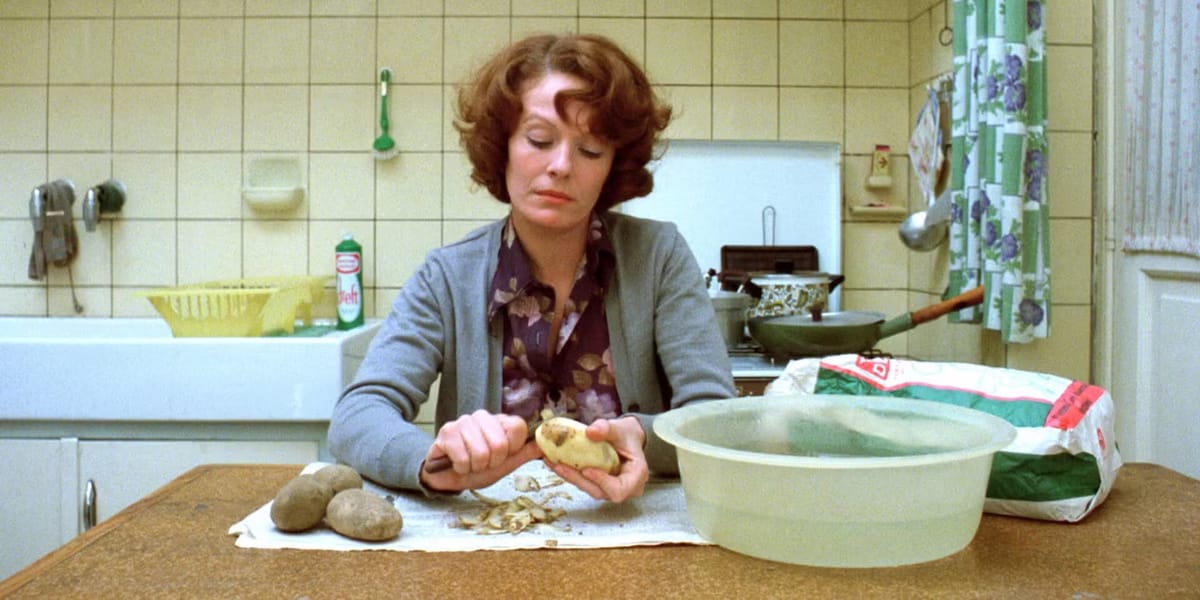

How do you read films? I come away from every film that I don’t feel intellectually superior to (I know how this sounds but I’m trying to be honest) feeling as though I might’ve missed something crucial, that I’ve watched the film incorrectly. I’m concerned that it’s a matter of intelligence and, therefore, incurable, but I’ll accept any tips on how I can interpret and enjoy films to their fullest extent with the brain that I have. Thanks
I appreciate you thanking me! I haven’t trawled through all the questions we’ve received since I started doing this but I’m willing to wager that you are the first person to offer any sort of gratitude, in nearly a year, for my tireless work helping out film-lovers the world over, week in, week out, working my fingers to the bone for a pittance out of sheer altruism. I don’t do it for thanks or recognition, of course — if I slave, it is for the art of cinema, and out of love for my fellow human — but a kind word along the way, such as this, can really help saintly figures such as myself or Greta Thunberg to feel like we aren’t labouring in vain. Thank you.
On to your question, which I have been circling around for a little while now as if it were a fortress, considering what will be my way in. Shall I hoist a rope over this barrier you have erected, namely the idea of intellectual superiority? Or would it be preferable to dig, rather, into the concept of ‘reading’ a film, and see if I can arrive at my destination that way?
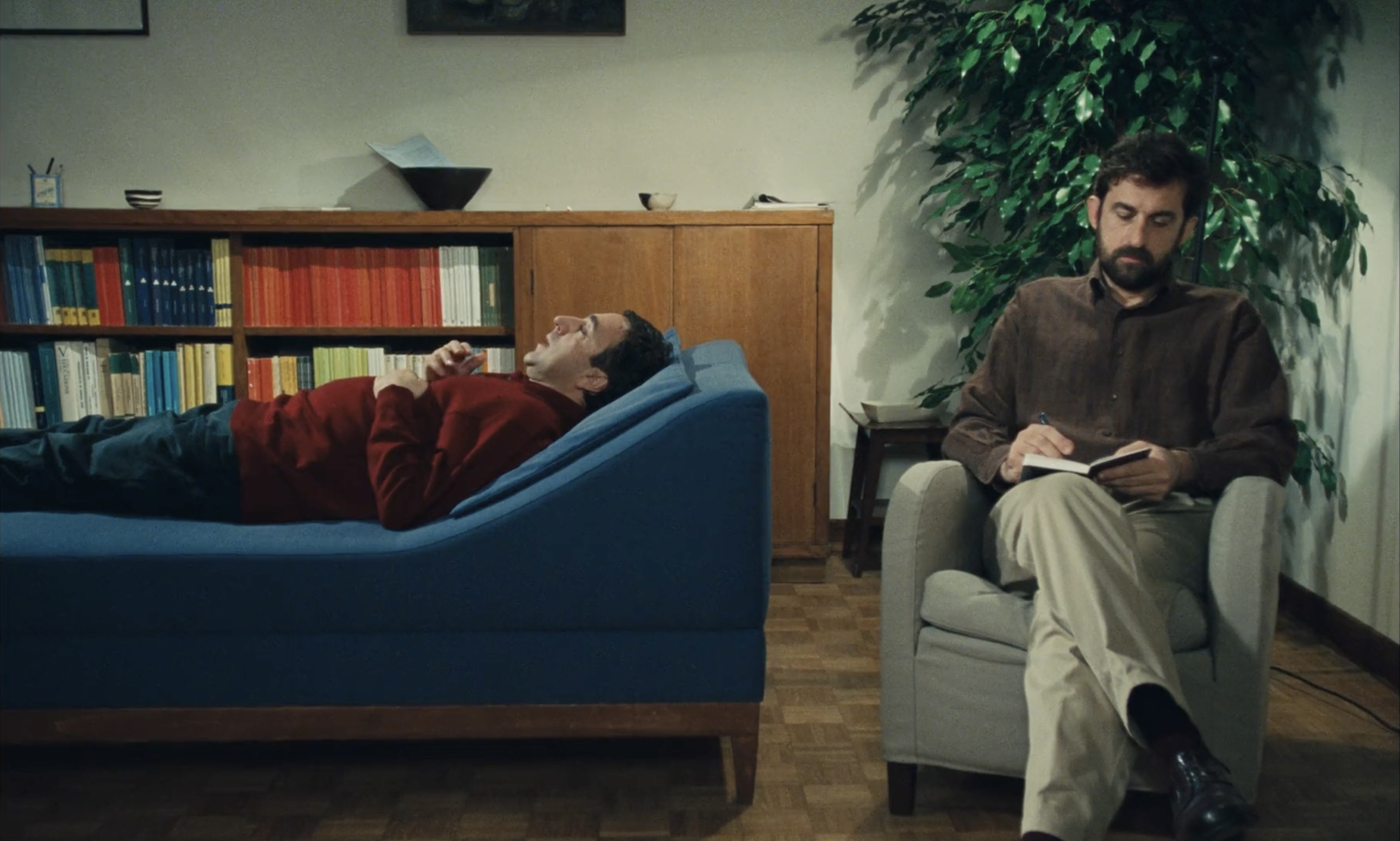
In Nanni Moretti’s film The Son’s Room (2001), he plays Giovanni, a psychoanalyst — and some of the film’s opening sequences, in setting the scene, depict him at his practice. We see him taking on a new client, who asks him with a snarl whether he considers himself ‘intelligent’ enough to analyse him. Giovanni deflects from this line of questioning, by saying that perhaps intelligence itself is not what is needed in the work they must do together, and that he may be able to provide something else that his client, who considers himself highly intelligent, has not considered. Of course, the lovely paradox of this scene is that Giovanni is perfectly intelligent, and his reply shows him to be so; but the ‘intelligence’ that the client claims for himself is of a rather thinner sort than the kind that Giovanni possesses. The client means intellectualism by it; IQ. What The Son’s Room shows, as Giovanni tries to come to terms with a personal tragedy that he encounters early on in the film, is that what he will need to draw on most of all, on the contrary, are emotional awareness, introspection, generosity, forgiveness, confidence, adaptability and discernment.
I am unable to rate your intellect — but of course one’s natural alertness and abilities, and the smattering of references and connections that we draw on, which are generally termed intelligence, enable one to ‘understand’ a film. Some films can be intellectually challenging, and require a great deal of thought in order to wrestle with the plain ‘argument’ that they set out. You might consider some of Bergman’s mid-career films in this light; or the movies of Éric Rohmer, say, some of which seem to advance a kind of thought experiment. Both My Night with Maud (1969) and The Green Ray (1986) have what the French call “une problématique” at their heart — that is, a discursive argument, hinging on some kind of questioning. Key to appreciating these films is a willingness to think about what is being laid out: in The Green Ray, that is nothing less than the idea of our connection to our environment/the world; Rohmer films the nearly moments, those dead hours of nothingness, and seems to be saying something about the dislocation of modernity, particularly in the metaphor of the “green ray”, that moment when the setting sun supposedly allows us to see into the souls of others. Rohmer, here, is less the author of the screenplay and more a witness to the random sallies of life; but I do think the film requires you to stay with him, and to engage with the shape of what is being proposed.
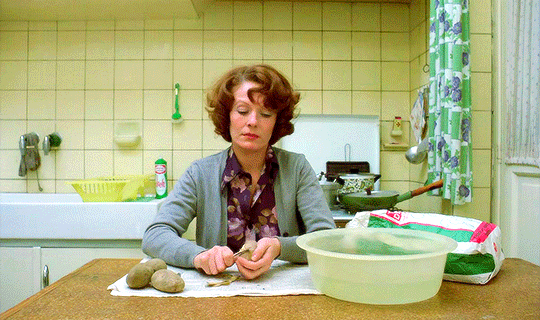
Likewise some of Alain Resnais’s more conceptual films, or the structuring methods of Jeanne Dielman, 23 quai du Commerce, 1080 Bruxelles (1975), whose repetitions require some deep thinking: arguably, these movies exist on a level that is not wholly sensorial, and must be interpreted in some way. It would be foolish to pretend that cinema doesn’t require an effort of thinking. And yet, I increasingly tend to think, like the shrink in The Son’s Room, that something else is needed; and as a spectator and critic I work very hard at considering cinema outside of pure story and argument. I don’t think there’s a ‘correct’ way to watch a film, or to read one, as you put it; but it may be that bringing other elements of your life to bear on a film (and art in general) could help tease out different pleasures or problems or things to chew on. When you watch, say, In the Mood For Love (2000), you are considering an object that is deeply sensual, and heaving with an emotion all the more unbearable for being so held back. How then do you approach such a film? When I first saw it, quite early in my film-going career, I had to do something different as a viewer, which was not to try to solve the film, but instead to surrender to it, surrender to beauty; have the pliability to let the film operate in its own idiom. It was the same with The Sweet Hereafter (1997), whose processes I initially found maddening: yes, I was able to grasp the film’s overarching theme of lost innocence, and its overt parallels with The Pied Piper of Hamelin; but what else was I missing? Could I allow myself to stare into Sarah Polley’s almost blank expression of seething resilience, and simply feel that, simply experience what was so forlorn and broken in her? Was I able to slow down my rhythm to the film’s icy pace, and listen to its country vernacular?
I grew up as the child of English teachers — my father being a very astute explicator of text, particularly poetry; I guess that, and my family’s rather classical tastes (Monet, Shakespeare, Austen, Merchant-Ivory), led me to an initially rather narrow conception of film, almost regarding it as filmed theatre, which I have really endeavoured to rid myself of. If you feel, at the end of a film, that you didn’t get it, I imagine one of two things happened: 1) you are right to feel what you are feeling, and should have confidence in your views and taste, or 2) you were somehow not able to place yourself on the film’s level, for whatever reason that may be. Over time, I have learnt to trust myself, and to stand by my opinions for the most part (although it’s good to be receptive to dissenting views and to let yourself shift). Especially with pictorial art, which I don’t know half as well as I know film, I now take pleasure in saying: “I love this painting” and “This exhibition didn’t work for me,” because I have now reached a position where I can trust myself. I don’t have all the knowledge, nor all the language; but I have some notions, and some words, and those are what I need.
Also, I’ll let you in on a secret: most filmmakers and writers aren’t actually that intelligent!
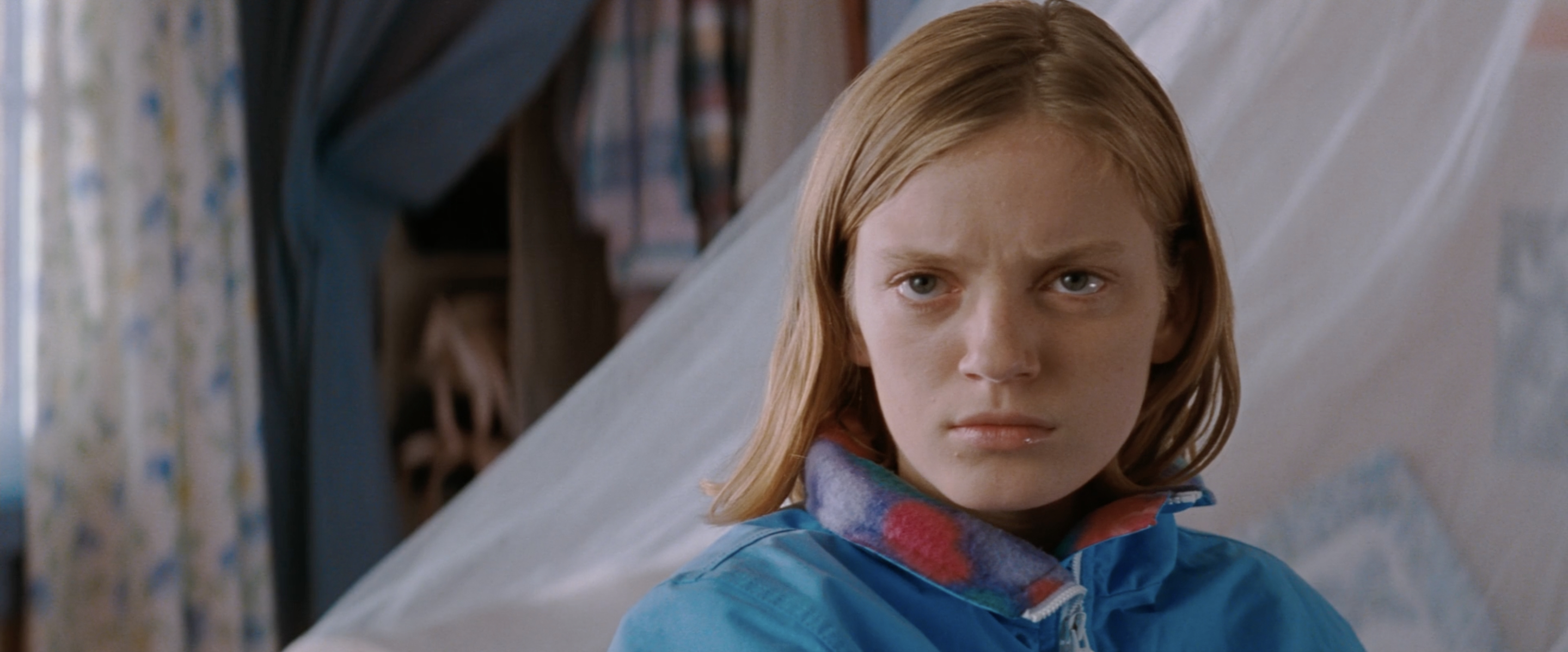
A couple more thoughts, and you can make of these what you will. Both are to do with this idea of ‘reading’ a film. The first is that in the last few weeks I’ve been listening to Middlemarch as an audiobook. Now, I’ve got into a lot of trouble online in the past for voicing the insensitive thought that listening to an audiobook doesn’t count as reading. Can’t blind people read, then???!!, everybody shouted at me, on a terrible Twitter afternoon. I won’t relitigate that, but although I am greatly enjoying Middlemarch, which is so wonderfully written, various elements of listening to the text are infelicitous to me; I realised that I would not hear voices in the way they are read to me, with these elaborate accents, and with so much ‘acting’. When Juliet Aubrey reads, “said Dorothea, sighing” it comes after she has just (of course!) sighed her way through that line of dialogue; that is superfluous, and at odds with the way anyone would read it for themselves. It changes one’s perception of the text. That is to say that someone else’s way of reading can not be your way of reading; we decipher the same codes, yes, and do so with the same set of rules, but everything else that we bring to it is deeply personal, and belongs to some numinous private realm of interpretation we have. This is yours, and it is not just all you have, but it is a gift, for you to enrich over time.
Here is the other thought: since having children, my whole approach to art exhibitions has changed, for the better I think. My kids are interested in art, and it’s a joy to go to a gallery with them, but of course they are kids and their attention wanders; I only have so much time available to me before they tire of the exhibition altogether. So what I do now is I go in more dynamically, and I try to filch some impressions here and there: I will take a good five minutes with one painting, and perhaps skim three more artefacts that don’t immediately arrest me; but what I seek to do is find one or two things — it doesn’t have to be much — that I can notice. An eyebrow turned just so; the artist’s signature; the dotting of white, up close, required to signify a lace handkerchief from afar; an echo from one photo to another. I encourage you to do that, as well; it’s good practice for film-watching. What have you noticed? Did you notice five things today? If I have seized upon some stuff and scampered away, I feel like I have gone about an exhibition or film in my own way, and I feel energised because I didn’t set myself the Sisyphean task of comprehending the whole thing. Instead, I looked, and really saw; and later, when the thing was no longer before me, I saw again, and I thereby memorialised it. That much you can do with the brain you have.
Send your questions anonymously to Caspar at this link, no personal information is collected.

